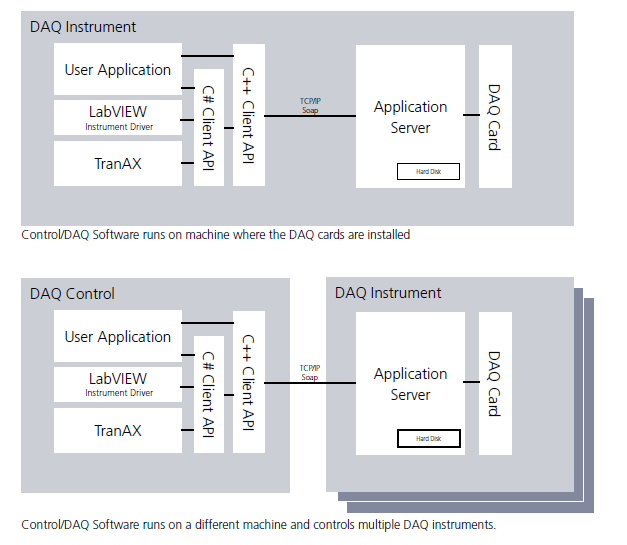RDK – TpcAccess
API for own software development
The Rapid Development Kit (RDK) TpcAccess provides developers of measurement software a simple solution to connect the TraNET devices as well as integrate the TPCE measurement cards into their own application.
The client/server architecture allows the application to run on the same device as the installed DAQ boards (TraNET EPC and PPC) or on a computer connected via Ethernet. It is also possible for multiple applications to access the hardware simultaneously.
For applications in C++ the TpcAccess Library is available under Windows or Linux. For Windows applications in C#, the TpcAccess Library is also available as a C# variant.
For applications in Python a corresponding wrapper of the C++ DLL is provided.

Downloads
TpcAccess API
Documentation
TpcAccess API
RDK Download
Clone API from GitHub github.com/elsysdaq/tpcaccess
Code Example C++
Connect to a Device
int deviceIx;
TPC_ErrorCode err;
// Connecting to one device:
TPC_BeginSystemDefinition();
deviceIx = TPC_AddDevice("192.168.0.107:10010"); // Replace the IP address with your device address
err = TPC_EndSystemDefinition(1000); // 1s timeout till connection failed
if(err != tpc_noError) return 1;
// Set default parameters
TPC_ResetConfiguration();Set Parameters
// Set recording mode to scope
TPC_SetParameter(deviceIx, 0, 0, tpc_parOperationMode, tpc_opModeScope);
// Set single shot and turn on auto trigger
TPC_SetParameter(deviceIx, 0, 0, tpc_parScopeAutoTrigger, 1);
TPC_SetParameter(deviceIx, 0, 0, tpc_parScopeSingleShot, 1);
// Set Sampling frequency to 10MHz
TPC_SetParameter(deviceIx, 0, 0, tpc_parSamplingFrequency,10000000);
// Set trigger delay to -50%
TPC_SetParameter(deviceIx, 0, 0, tpc_parScopeTriggerDelay, -50);
// Set Block Size to 16k Samples
TPC_SetParameter(deviceIx, 0, 0, tpc_parScopeBlockLength, 4096);
// Set Board 0, Channel 0, Input Range to 5V, 0% Offset
TPC_SetParameter(deviceIx, 0, 0, tpc_parRange, 5);
TPC_SetParameter(deviceIx, 0, 0, tpc_parOffset, 0);
// Set Trigger Board 0, Channel 0, Positive Slope at 1V, 0.1V hysteris
TPC_SetTrigger(deviceIx,0,0,tpc_etrgSlope,tpc_etrgCompPositive,tpc_etrgNone, 1,0.1); Start the Measurement
int measurementNumber = 0;
TPC_MakeMeasurement(2000,&measurementNumber);
// readout time meta data
TPC_TMetaData tmetaData;
TPC_GetTMetaData(deviceIx, 0, 0, m_iMeasurementNumber, &tmetaData, sizeof(TPC_TMetaData));
cout << endl << "Meas. Start Time: " << tmetaData.startTime.hour << ":"
<< tmetaData.startTime.minute << ":"
<< tmetaData.startTime.second << endl;
cout << "Trigger Sample: " << tmetaData.triggerSample << endl;
cout << "Trigger Time: " << tmetaData.triggerTime << endl;
// read out y meta data
TPC_YMetaData ymetaData;
TPC_GetYMetaData(deviceIx, 0, 0, m_iMeasurementNumber, &ymetaData, sizeof(TPC_YMetaData));
uint32_t analogMask = ymetaData.analogMask;
uint32_t markerMask = ymetaData.markerMask;
double bintoVoltFactor = ymetaData.binToVoltFactor;
double bintoVoltConstant = ymetaData.binToVoltConstant;Data Read-out
// get raw data
int32_t *rawData, *analogData, *markerData;
rawData = new int32_t[4096];
analogData = new int32_t[4096];
markerData = new int32_t[4096];
TPC_GetRawData(deviceIx, 0, 0, 0, m_iMeasurementNumber, 0, 4096, rawData);
double* voltageData;
voltageData = new double[4096];
// get analog an marker data
for(int i = 0; i < 4096; i++){
analogData[i] = rawData[i] & analogMask; // Mask digital marker data from the analog data
markerData[i] = rawData[i] & markerMask; // Extract the digital marker signals
// scale to voltage (this gives the same data as the TPC_GetData function)
voltageData[i] = (analogData[i]* bintoVoltFactor) + bintoVoltConstant;
cout << voltageData[i] << endl;
} 

